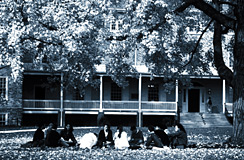
ABOVE: Students at Haverford College campus.
“How often do we encounter a research program that addresses a set of questions so central, so pivotal, so critical, and in retrospect, so obvious,that we wonder aloud why no one thought to ask these questions before?”
— Lee S. Shulman, President, The Carnegie Foundation for the Advancement of Learning
|  | Early Findings
The national study is based on the 2003 survey of 3,680 students from 46 colleges and universities. A first step in an ambitious multiyear look at spirituality among college students, the study assesses how the college experience influences spiritual development.
The survey was guided by the following questions:
• How many students are actively searching and curious about spiritual issues and questions such as the nature of God/Divine/Universal Spirit and the meaning of life and work? What kinds of curricular and cocurricular experiences facilitate this spiritual quest (e.g., community service work, “peak” experiences, peer relationships, campus ministry, particular courses or particular faculty members, etc.)?
• How do students view themselves in terms of spirituality and related qualities or virtues such as compassion, honesty, optimism, and humility? How is their academic and career development affected by such self-perceptions?
• What spiritual/religious practices and behaviors (e.g. rituals, prayer/meditation, service to others, etc.) are students most or least attracted to? How do such practices relate to other aspects of students' academic and personal development?
• What is the connection between traditional religious practice and spiritual development?
• What effect does religious doubt have on students' spiritual development?
• What most gets in the way of students' spiritual/religious quest (e.g. peer pressures, school pressures, work commitments, etc.)?
Key findings in the first study show clearly that college students are concerned about spiritual matters:
78% discuss religion/spirituality with friends.
77% pray.
71% find religion personally helpful.
73% say religious/spiritual beliefs help develop their identity.
62% report their professors never encourage discussions of religious/spiritual issues.
Concern about religion and spirituality, however, does not appear to be associated with intolerance.
88% agree that nonreligious people can be just as moral as religious people.
70% agree that most people can grow spiritually without being religious.
The data also shows a modest increase in the number of students who say it is "very important" to integrate spirituality into their lives, develop a meaningful philosophy of life, and help others who are in difficulty. Despite a decline in some of the traditional modes of religious expression, students are indeed using their college years as a time of spiritual reflection.
65% question their religious and/or spiritual beliefs at least occasionally.
73% say their spiritual/religious beliefs have helped them develop their identity.
74% say those beliefs provide strength, support and guidance.
9% of students report that their “religousness” is “much stronger” since entering college.
86% say that an “essential” or “very important” goal in life is attaining wisdom; 84% rate becoming “a more loving person” highly.
The study also compared changes in the outlooks of the polled students from their freshman year to their junior year. One of the most dramatic changes was the drop-off in attendance of religious services: 52% reported attending religious services frequently the year before they entered college, but only 29% said they did the same by their junior year.
The percentage of students who say it is “very important” or “essential” to integrate spirituality into their lives, however, climbed from 51% in the poll three years ago to 58% in the current survey. Over the same period the percentages of students who consider it very important to develop a meaningful philosophy of life climbed from 43% to 52%, and those believing it is very important or essential to help others who are in difficulty rose from 60% to 74%.
College students are very much engaged in spirituality and religion,” says Astin. “Clearly, it's far more important to them than most people in higher education may assume.” Astin and his colleagues hope that the multiyear longitudinal study will contribute to much-needed benchmarks in higher education benefiting both the students and the institution. “The long-term interest here is in helping people become more engaged citizens, more responsible parents, better neighbors. All of these are legitimate goals for an educational institution. But if you ignore a major part of a student’s inner development, then you are going to have a hard time doing this,” Astin says.
The next stage of research will survey 90,000 college freshmen in the fall of 2004, then follow up with selected surveys and interviews in the spring of their third year.
The Project Directors
Alexander W. Astin has written 20 books and more than 300 other publications. He is the most-frequently cited author in the field of higher education. He shares the leadership of the project with Helen S. Astin, also a director of HERI, and Dr. Jennifer A. Lindholm.
 Helen S. Astin is Professor of Higher Education and Associate Director of HERI. She has published numerous articles and 11 books, and has won numerous awards for her work on leadership and spirituality in higher education. Helen S. Astin is Professor of Higher Education and Associate Director of HERI. She has published numerous articles and 11 books, and has won numerous awards for her work on leadership and spirituality in higher education.
Jennifer A. Lindholm is Associate Director of the Cooperative Institutional Research Program at HERI. Her scholarship focuses on professional behavior of college and university faculty, issues related to institutional change and undergraduate students' personal development.
For more information please visit: www.spirituality.ucla.edu
|